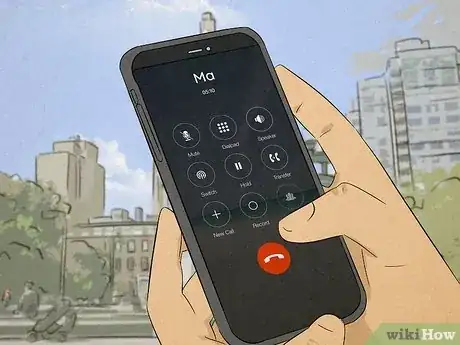This article was co-authored by Trudi Griffin, LPC, MS. Trudi Griffin is a Licensed Professional Counselor in Wisconsin specializing in Addictions and Mental Health. She provides therapy to people who struggle with addictions, mental health, and trauma in community health settings and private practice. She received her MS in Clinical Mental Health Counseling from Marquette University in 2011.
There are 8 references cited in this article, which can be found at the bottom of the page.
This article has been viewed 416,907 times.
You've heard the old saying that it's better to say nothing if you can't say something nice. This might be the case after you've had an argument with your parents. To avoid saying something hurtful, you'll need to avoid your parents at home, stay out of the house when you can, and come to terms with your feelings. If you're living on your own, you can take additional steps to avoid talking to them.
Steps
Coming to Terms with Your Feelings
-
1Assess your situation. Decide if avoiding talking to your parents is really worth it. It's okay to keep your distance to cool down from an argument. On the other hand, if you're in some kind of trouble, your parents might actually be able to help.[1]
- It is also helpful to ask yourself why you are avoiding your parents and what you hope to accomplish by avoiding them. Understanding your motivation can help you understand how to best move forward.
-
2Keep a diary. This can help you to see what you're feeling in print. Start by free writing. Jot down anything that comes to mind. Don't worry about complete sentences or grammatical correctness. Put dates on your entries so you can keep a timeline of your feelings. Use a paper diary with a lock or an encrypted file to keep your parents from snooping.[2]Advertisement
-
3Make up with your parents, if possible. Give them and yourself a few days to cool down. Then, make the first move toward peace talks if they don't do it first. Apologize if you're at fault. If you can't bury the hatchet yourself, try to find a neutral third party to act as a mediator.[3]
-
4Seek the help of a therapist. Wanting to avoid your parents is an indication that something is wrong with your relationship. Talk to a school counselor or see a therapist to get help and recommendations for how to move forward. You may also consider family therapy if your parents are willing to do this with you.
- If you live with your parents and your situation at home is abusive or intolerable for other reasons, then you may also consider reaching out to family or a school counselor to help you find other living arrangements.
Avoiding Your Parents at Home
-
1Cut off the conversation. Don't be rude or disrespectful. Give short, noncommittal answers to any questions they ask. If they ask if you want dinner or if you'll go somewhere with them, say no politely.[4]
- Break or bend this rule if they're asking questions that might lead to reconciliation. Listen before you respond.
-
2Lock yourself in your room. Turn the latch or slip the hook into the eye. Put a note on your door explaining that you've locked the door for some space and privacy. If you just lock your door without warning, your parents could get worried and break the door down.[5]
- If you don't have a lock on your door, put a sign on the door asking people to keep out or at least knock first.
-
3Take your creature comforts to your room. This includes your books, phone, and video game console. Find a cool, dry place to stash a few non-perishable snacks and drinks. Keep your phone on vibrate or silent to avoid attracting your parents' attention.[6]
-
4Tell your friends not to call your landline phone. If your parents answer the phone, you'll have to face them when you answer it. Have your friends call your cell phone, if you have one. If not, stick to email, instant messaging, and chat rooms.
-
5Show consideration for your roommate, if you have one. If you share a room with a sibling, respect their space. Don't hog the room for yourself. If they ask about the situation with your parents, keep your story neutral. Don't try to make your sibling take sides.
Staying Out of the House
-
1Spend more time with your friends. Do something fun to get your mind off your parents. If you need to cry or vent, make sure you're with a good friend who will understand. Even if you just hang out doing nothing, your friend's presence can do wonders for your mood.[7]
-
2Find other ways to get to school. Spending time in the same car as your parents will make things awkward. If you live close to your school, walk or ride your bike there. Take the school bus or public transit if you can. If all else fails, try to get a ride with your friends.
- If you must ride with your parents, keep your headphones on for the whole ride.
-
3Get an after-school job. The time away from home will give you space and independence from your parents. Also, earning your own money will allow you to avoid asking your parents for theirs. Just make sure your job doesn't conflict with school, homework, or sleep.[8]
-
4Participate in extra-curricular activities. Join a sports team that appeals to you. Get involved in school clubs. Volunteer in your community. You'll not only get space from your parents, you'll also build confidence and collect bonus points for college applications.[9]
-
5Study at the library. The presence of your parents can add stress and eat into your study time. On the other hand, the quiet policy of most libraries will allow you to work without distractions. Study alone or meet up with a study group. You can also use online databases that you might not be able to use at home.
Avoiding Your Parents after You've Moved Out
-
1Don't return their calls. Press the reject button when you see their number on the caller ID. If you have a flip phone, press one of the side buttons to silence the ringer. Either way, the call will go to voicemail. Whether you listen to the message or delete it immediately is up to you.[10]
-
2Avoid electronic communication. Don't return their emails. Unfollow them and make your timeline private if you're connected on social media. If you don't want to completely sever ties, just mute their posts. They won't know, and you can always unmute them if you make up.
-
3Keep a physical distance. Don't visit them and tell them not to visit. Keep yourself busy if you don't want to make up excuses. Focus on your career or academic goals. Go out with your friends after work. Take a vacation if you can afford it.[11]
Expert Q&A
Did you know you can get expert answers for this article?
Unlock expert answers by supporting wikiHow
-
QuestionMy dad keeps on yelling at me to do chores for him and I can't rest. What should I do?
 Trudi Griffin, LPC, MSTrudi Griffin is a Licensed Professional Counselor in Wisconsin specializing in Addictions and Mental Health. She provides therapy to people who struggle with addictions, mental health, and trauma in community health settings and private practice. She received her MS in Clinical Mental Health Counseling from Marquette University in 2011.
Trudi Griffin, LPC, MSTrudi Griffin is a Licensed Professional Counselor in Wisconsin specializing in Addictions and Mental Health. She provides therapy to people who struggle with addictions, mental health, and trauma in community health settings and private practice. She received her MS in Clinical Mental Health Counseling from Marquette University in 2011.
Professional Counselor Ask for help from a family member, family friend, or school counselor. There may be something going on with your dad where he is taking things out on you, especially if you are not doing anything to provoke the yelling. The best remedy for this is family therapy and a school counselor could help you find someone.
Ask for help from a family member, family friend, or school counselor. There may be something going on with your dad where he is taking things out on you, especially if you are not doing anything to provoke the yelling. The best remedy for this is family therapy and a school counselor could help you find someone. -
QuestionMy mom has been shouting at me for no reason. It's like she has got nothing else to do. I try my best to help her, but she says I make life hard. How can I avoid her?
 Trudi Griffin, LPC, MSTrudi Griffin is a Licensed Professional Counselor in Wisconsin specializing in Addictions and Mental Health. She provides therapy to people who struggle with addictions, mental health, and trauma in community health settings and private practice. She received her MS in Clinical Mental Health Counseling from Marquette University in 2011.
Trudi Griffin, LPC, MSTrudi Griffin is a Licensed Professional Counselor in Wisconsin specializing in Addictions and Mental Health. She provides therapy to people who struggle with addictions, mental health, and trauma in community health settings and private practice. She received her MS in Clinical Mental Health Counseling from Marquette University in 2011.
Professional Counselor She says you make life hard. I wonder what she means by that? You say you try your best to help her, but perhaps your wires are getting crossed and what you think is helping she is interpreting as something else. It may be wise to enlist the help of a family member to help the two of you mediate an agreement, or even try getting some therapy for the two of you. If you go to your school counselor, they can provide referrals.
She says you make life hard. I wonder what she means by that? You say you try your best to help her, but perhaps your wires are getting crossed and what you think is helping she is interpreting as something else. It may be wise to enlist the help of a family member to help the two of you mediate an agreement, or even try getting some therapy for the two of you. If you go to your school counselor, they can provide referrals.
Warnings
- Don't yell or be rude to your parents. That will give them an excuse to punish you. When you have to, answer them quickly and politely.⧼thumbs_response⧽
- Allow your parents to see that you are doing okay alone. Allowing them to see you sad and/or lonely can cause them to worry and jump to conclusions about you or what you are doing.⧼thumbs_response⧽
References
- ↑ http://www.teenvogue.com/story/fighting-with-your-mom
- ↑ https://www.theguardian.com/science/2009/feb/15/psychology-usa
- ↑ http://www.teenvogue.com/story/fighting-with-your-mom
- ↑ https://www.nytimes.com/2016/09/14/well/family/when-teenagers-bristle-at-how-was-school.html
- ↑ http://www.professorshouse.com/should-teenagers-be-able-to-lock-their-bedroom-door/
- ↑ https://www.apartmenttherapy.com/living-with-your-parents-how-to-turn-your-room-into-a-mini-apartment-225928
- ↑ https://www.mindbodygreen.com/0-20069/why-spending-time-with-friends-boosts-your-oxytocin.html
- ↑ http://www.hercampus.com/high-school/4-ways-set-boundaries-your-parents-college
- ↑ http://www.courierpostonline.com/story/life/2015/09/25/6-great-things-extracurricular-activities/72768898/
About This Article
If you still live at home and want to avoid talking to your parents, try to keep yourself busy by spending more time with your friends or getting a part-time job. You can also sign up for extra-curricular activities or spend more time studying at the library so that you have reasons to be away from home. When you are home, you can lock yourself in your room and put a note on your door informing your parents that you don't to be disturbed. It's totally normal to avoid talking to your parents after a fight, but once everyone cools down, consider reopening the lines of communication. Since you all live under the same roof, you can't avoid your parents forever! For tips on avoiding talking to your parents if you've already moved out, read on!
















































































